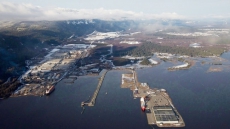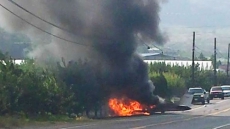FORT ST. JOHN, B.C. — The British Columbia government has granted approval for the first phase of construction to start on the massive Site C hydroelectric dam project on the Peace River.
Two dozen authorizations include conditions under the land, water, forest and wildlife acts and provide permits for timber removal, road building and site preparation.
Forests, Lands and Natural Resources Minister Steve Thomson said there were initially 45 permit applications submitted, but several of them were deferred to allow more time for consultations with First Nations.
Thomson said each application for the construction phase was reviewed for its potential impact on the environment and on aboriginal treaty rights.
All the decisions makers are satisfied that the consultation process was adequate and upholds the duty to consult local First Nations, Thomson said Tuesday.
"A number of the permits have conditions attached to them that were concerns raised during that process," he said in a interview.
Concerns include seasonal timing restrictions, conditions for wildlife, and the sharing of plans with First Nations, Thomson said.
Consultations with the local Treaty 8 First Nation began in August 2014 and concluded last month, but Thomson wouldn't say if the two sides had reached a resolution.
"We have been through the appropriate consultation process. As you know, concerns have been expressed by First Nations. We will see what the response to the decision is," he said.
Several lawsuits by environmental groups, citizens and First Nations have been launched to try to stop construction of the dam and are proceeding through the courts.
But Thomson said the legal action won't stop the building process.
"This is a very, very important project for British Columbia. It has been through an environmental assessment process with conditions. The permits that are needed to get the initial process started have been through an extensive process."
No one from the Treaty 8 First Nation was available for an interview.
Construction of the almost $9-billion project is touted to generate about 10,000 jobs while it floods 55 square kilometres of river valley.
Site C represents an eight per cent increase to Hydro's energy supply and is expected to generate enough electricity to power about 450,000 homes per year.





